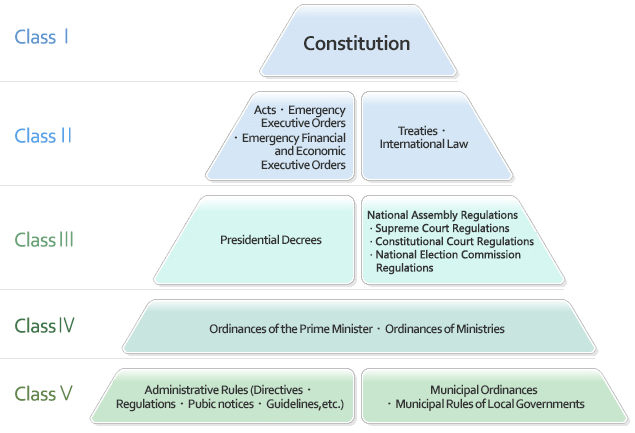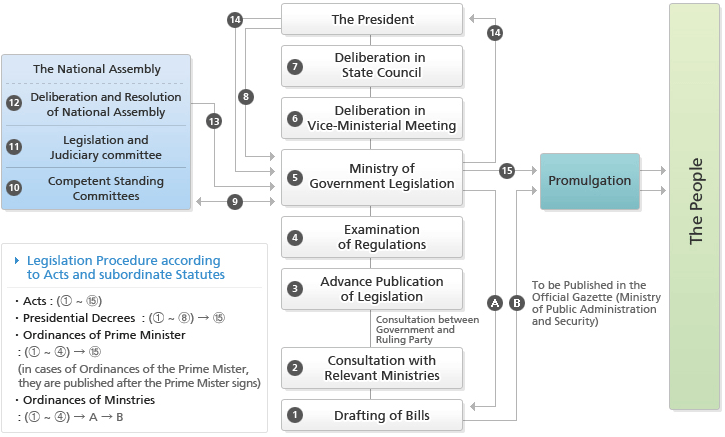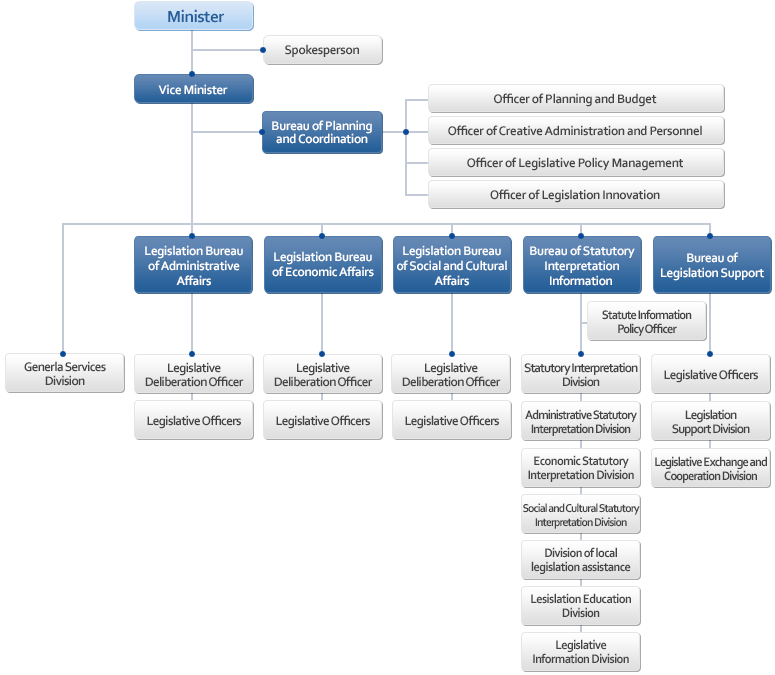
The Korean legislative system consists of the Constitution as the paramount law, Acts to realize the constitutional notions, and administrative legislation including Presidential Decrees, Ordinances of the Prime Minister, Ordinances of Ministries and so forth to effectively implement the Acts. Since the Acts and subordinate statutes form a certain hierarchy, subordinate statutes that are enacted under powers delegated by Acts or are enacted for the purpose of enforcing Acts are not permitted to contain details in conflict with such Acts.
For cases on whether subordinate statutes are in conflict with Acts, which are raised in the course of enforcing such Acts, the Adjudication on the Constitutionality of Acts and the Constitutional Complaints of the Constitutional Court address on whether any Act is in violation of the Constitution. Futhermore, the Supreme Court holds the authority to make a final review on whether any order, rule, or disposition is in violation of the Constitution or Acts.

Acts are the forms of legal norms stipulated by the legislative principles of the National Assembly and prescribe the principle of legality, principle of legislated taxation, requirements for acquisition of Korean nationality, expropriation and indemnity of property rights, establishment of Ministries and categories of local governments and such.
All of the rights and freedoms of the people may be restricted by Acts in cases where it is deemed necessary to do so for the purpose of safeguarding national security and maintaining public order or public welfare, and even if such rights and freedoms are restricted, essential elements of such rights and freedoms are protected from being infringed on. Emergency executive orders and emergency financial and economic executive orders are issued by the President in the event of any national emergency. They have the effect of Acts only when the President obtains such approval from the National Assembly.
International treaties mean agreements concluded in writing among nations while international laws mean and international, the enforcement power of which is generally recognized by the international community even though the Republic of Korea is not a signatory nation thereto, and includes international customary laws. The Constitution of the Republic of Korea stipulates the observance of international law, and prescribes that treaties concluded and promulgated under the Constitution and international laws generally recognized have the same effect as those of domestic laws.
"The same effect as those of domestic laws" refers to the fact that any treaties or international laws falling under any domestic Acts or subordinate statues have the same effect as those of the relevant domestic Acts or subordinate statutes, respectively. In cases where the Government concludes any treaty in conflict with domestic Acts, the Government is required to seek consent from the National Assembly. Some treaties require legislative measures for enactment as domestic Acts in order to be implemented.
Orders refer to all of subordinate statutes (excluding any treaties, international laws, and municipal ordinances and rules) prescribed by administrative power. Administrative legislation includes Presidential Decrees, Ordinances of Prime Minister and Ministries, and administrative rules. Presidential Decrees issued by the President, the head of the Executive, consists of delegated orders and execution orders. The jurisdiction of such orders extends over all administrative affairs under the jurisdiction of the Executive.
The Ordinances of the Prime Minister are enacted with respect to matters under the jurisdiction of the Ministry of Planning and Budget, the Ministry of Government Legislation, the Ministry of Patriots and Veterans Affairs, etc. that are administrative agencies under the direct supervision of the Prime Minister among the ministries of the Executive. Ordinances of the Prime Minister are generally viewed to stand on par with Ordinances of Ministries in their hierarchy.
The Constitution guarantees self-governance of local governments. Local governments exercise autonomous legislative powers to lay down local Ordinances and Rules. Municipal Ordinances are laid down after going through deliberation thereon by local councils and Municipal Rules are laid down by the heads of local governments.

<Table 1. Hierarchy of Acts & Subordinate Statutes>

Legislative procedures refer to a series of procedures ranging from the drafting of Bills to their promulgations. The Constitution of the Republic of Korea grants the National Assembly the power of legislation and permits the Executive branch and other agencies to exercise lawmaking powers on subordinate statutes other than Acts.

<Table 2. Legislative Process>

· Fast and accurate legalization of state affairs, managed systematically and supportively of governmental legislation
· Effective enactment, regards planning and combining government legislative processes
· Fast legalization of policy, actively supporting legislation of assembly members and local government
· Seeking out and improving statutes so as not to, overburden the individuals’ life and the companies’ business
· Enhancing the public’s understanding of the statutes through ‘Easy to Understand Statute Project’
· Fast realization of government policy, with special improvement of lower laws and regulations

· Bureau of Statutory Interpretation and Information-interprets various statutes and provides convenient legal services to the public.
· Bureau of Planning and Coordination- supervises legislative efforts of government, task of statutory improvement for the satisfaction of the public and planning,
and administration management tasks.
· Bureau of Legislation Support –supports planning statutes and Legislation by Assembly members and is responsible for legislative exchanges with foreign countries.
· Spokesperson’s Office – is responsible for public affairs and relations.


